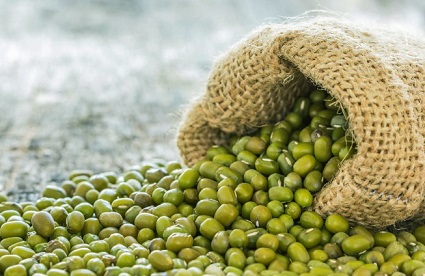Thailand Medical Study Shows Mung Bean Protein Improves Cardiovascular Health in Middle-Aged Adults
Nikhil Prasad Fact checked by:Thailand Medical News Team Oct 28, 2024 5 months, 2 weeks, 2 days, 26 minutes ago
Thailand Medical: Mung Bean Protein as a Functional Health Supplement
In a groundbreaking study led by researchers from Khon Kaen University’s Faculty of Medicine and Human High Performance and Health Promotion Research Institute in Thailand, scientists have discovered promising cardiovascular benefits linked to mung bean protein consumption. This study highlights how mung bean protein, a nutrient-dense legume, can potentially enhance cardiovascular health in middle-aged adults by promoting endothelial function, reducing inflammation, and boosting antioxidant defenses.
 Thailand Medical Study Shows Mung Bean Protein Improves Cardiovascular Health in Middle-Aged Adults
Antioxidant and Anti-Inflammatory Benefits of Mung Beans
Thailand Medical Study Shows Mung Bean Protein Improves Cardiovascular Health in Middle-Aged Adults
Antioxidant and Anti-Inflammatory Benefits of Mung Beans
This
Thailand Medical News report delves into the study’s core findings, shedding light on how consuming mung bean protein significantly improved vascular health indicators in middle-aged participants. The protein, derived from Vigna radiata or mung beans, showed marked antioxidant properties and inflammation modulation abilities, both critical for heart health. The study's findings underscore how this traditional Asian food source, often included in dietary staples, can aid in protecting against oxidative stress and inflammation - two main contributors to cardiovascular disease.
According to researchers Supaporn Muchimapura, Wipawee Thukhammee, and Weerapon Sangartit, the team aimed to explore how mung bean protein impacts endothelial function, an essential component in maintaining healthy blood vessels. They theorized that the protein's natural properties could help counter the aging effects on blood vessels, thus supporting heart health.
Study Design: The Six-Week Mung Bean Intervention
To validate these theories, a three-arm, randomized, double-blind, placebo-controlled trial was conducted with participants between the ages of 45 and 60. The study split participants into three groups: one consuming a placebo drink and two others consuming drinks with varying doses of mung bean protein (10g and 15g). The six-week intervention involved daily intake, with each serving measured for nutrient consistency.
Endothelial health was assessed through flow-mediated dilation (FMD) tests, which measured changes in artery diameter in response to blood flow - an indicator of blood vessel flexibility and function. Researchers also measured various antioxidant enzyme activities and inflammation markers before and after the intervention, capturing the protein’s impact on both cellular and vascular levels.
Key Findings: Improved Vascular Health and Reduced Inflammation
The trial's findings were clear: regular consumption of mung bean protein improved endothelial function, as indicated by enhanced FMD results.
Participants in both the 10g and 15g mung bean protein groups showed better dilation responses compared to the placebo group. The FMD increase suggested that mung bean protein contribute
s to better artery relaxation and blood flow, which are essential for maintaining heart health and preventing vascular issues as people age.
In terms of inflammation, the study measured pro-inflammatory markers such as NF-kB, TNF-α, and IL-6. Significant reductions in these markers were observed in both protein groups, with the 10g dose showing the strongest anti-inflammatory effect. This indicates that mung bean protein may help regulate inflammation, offering a protective mechanism against chronic diseases often associated with age-related inflammation.
Antioxidant Benefits: Shielding the Heart from Oxidative Stress
Alongside its anti-inflammatory effects, mung bean protein displayed powerful antioxidant properties. Oxidative stress - a process where excess free radicals damage cells - is a primary contributor to heart disease, especially as the body’s natural antioxidant production decreases with age. The study observed that participants consuming mung bean protein had increased levels of antioxidant enzymes, particularly glutathione peroxidase, which is essential for neutralizing harmful oxidative compounds. Notably, this antioxidant effect was particularly pronounced in the 10g dose group, suggesting an optimal level of intake for maximum benefit.
The mung bean drink's composition, rich in polyphenols and flavonoids, likely played a significant role in this antioxidant activity. These compounds are known for their ability to scavenge free radicals, supporting cellular health and protecting blood vessels from oxidative damage.
Amino Acids in Mung Beans: Supporting Cardiovascular Health
One unique aspect of mung bean protein is its high essential amino acid (EAA) content, including amino acids like leucine, lysine, and valine, which are crucial for muscle repair and metabolic health. Additionally, non-essential amino acids like arginine play a role in nitric oxide (NO) production, a molecule critical for blood vessel dilation. Interestingly, the study found reduced levels of NO in the mung bean groups, which may suggest a balanced modulation of nitric oxide synthase (NOS) activity, potentially enhancing vessel sensitivity to NO and further aiding blood flow.
Concluding Remarks: Potential Health Benefits of Mung Bean Protein
In conclusion, this Thailand-based study illustrates how a common plant protein source, such as mung bean, can provide significant health benefits, particularly for middle-aged adults at risk for cardiovascular diseases. The combination of anti-inflammatory, antioxidant, and vascular benefits positions mung bean protein as a functional health food, supporting the body's natural defenses against age-related diseases.
The findings suggest that incorporating mung bean protein into daily diets may be a practical, natural approach to bolstering heart health, especially for those interested in plant-based dietary options. As more studies confirm the health benefits of traditional foods like mung beans, it becomes increasingly clear how valuable these natural sources are in promoting wellness.
The study findings were published in the peer-reviewed journal: Foods.
https://www.mdpi.com/2304-8158/13/21/3427
For the latest Research News, keep on logging to
Thailand Medical News.
Read Also:
https://www.thailandmedical.news/news/thailand-medical-researchers-explore-triphala-s-role-in-combating-obesity
https://www.thailandmedical.news/news/study-reveals-alarming-levels-of-low-empathy-among-medical-students-and-residents-in-thailand
https://www.thailandmedical.news/news/thailand-medical-researchers-discover-immunity-and-cancer-fighting-potential-in-peptides-of-white-jellyfish
